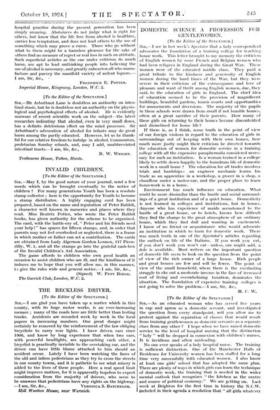DOMESTIC SCIENCE A PROFESSION FOR GENTLEWOMEN.
[To the Editor of the SPECTATOR.] Sin,—I see in last week's Spectator that a lady correspondent advocates the foundation of a training college for teaching house work. This letter brought to my memory the criticii-ni of English women by some French and Belgian women who had been refugees in England during the Great War. These women were of the educated middle class. They paid a great tribute to the kindness and generosity of English women during the hard times of the War, but they were severe in their criticism of the extravagance and love of pleasure and want of thrift among English women, due, they said, to the education of girls in England. The chief idea of- education seemed to be the provision of magnificent buildings, beautiful gardens, tennis courts and opportunities for amusements and diversions. The majority of the pupils in these schools were drawn from small if not humble homes, often at a great sacrifice of their parents. How many of these girls on returning to their homes became discontented and disinclined for home life ?
If there is, as I think, some truth in the point of view of our foreign visitors in regard to the education of girls in surroundings out of keeping with their own homes, how much more justly might their criticism be directed towards the education of women for domestic service in a training college with all the expensive paraphernalia considered neces- sary for such an institution. Is a woman trained in a college likely to settle down happily to the humdrum life of domestic work in a small home ? The education for all trades involves trials and hardships : an engineer mechanic learns his trade as an apprentice in a workshop, a grocer in a shop, a chauffeur under a motor-ear, and the proper place to learn housework is in a home.
Environment has much influence on education. What could be more dissimilar than the bustle and social surround- ings of a great institution and of a quiet home. Domesticity is not learned in colleges and institutions, but in homes. Anyone who has experience of maids accustomed to the bustle of a great house, or to hotels, knows how difficult they find the change to the great atmosphere of an ordinary house, which they find dull and wanting in excitement. I know of no friend. or acquaintance who would advocate an institution in which to train for domestic work. There was much truth in one of the Spectator's articles regarding the outlook on life of the Italians. If you work you eat, if you don't work you won't eat—unless, one might add, a dole is available. Most writers on the important question of domestic life seem to look on the question from the point of view of the rich owner of a large house. Rich people and great houses are few and will be fewer. The point of view of the small household, where there is the everlasting struggle to eke out a moderate income in the face of increased cost of living and overwhelming taxation, dominates the Situation. The foundation of expensive training colleges is. not going to solve the problem.—I am, Sir, &c.,
M. C. W.


























































 Previous page
Previous page